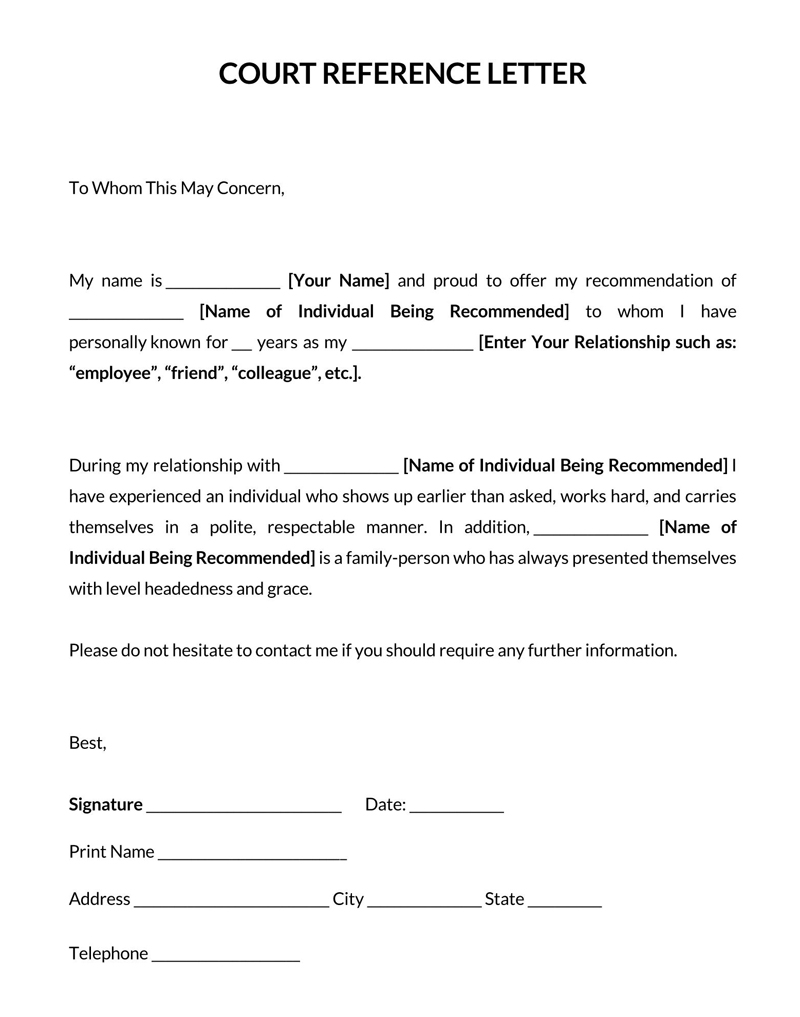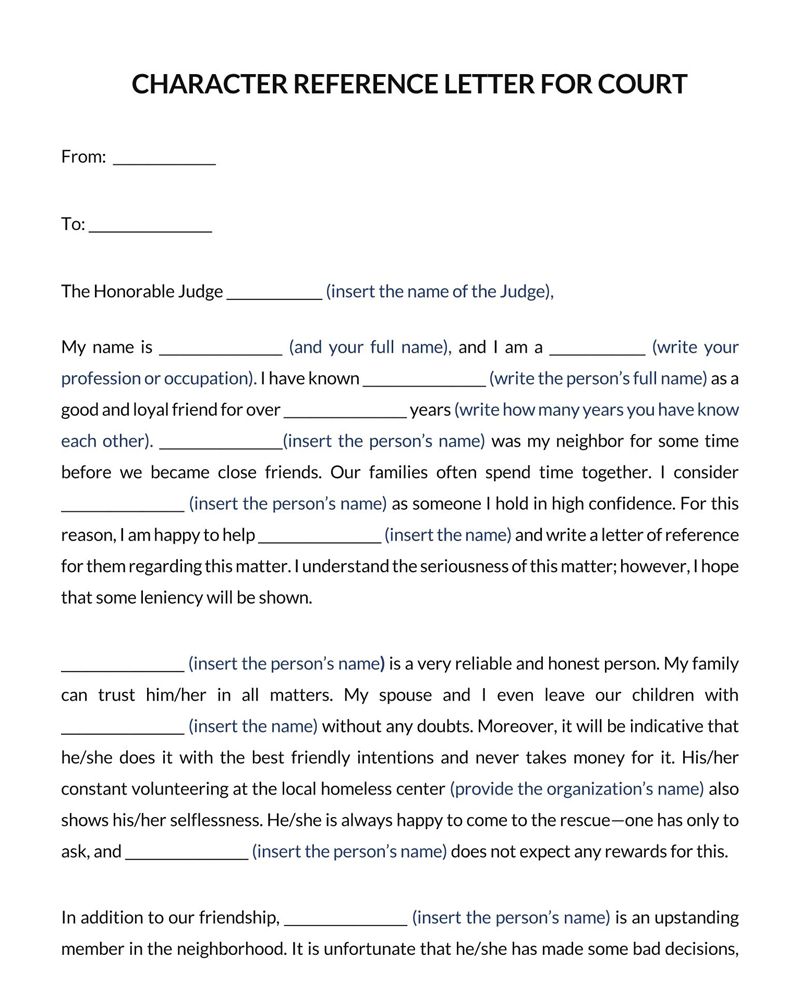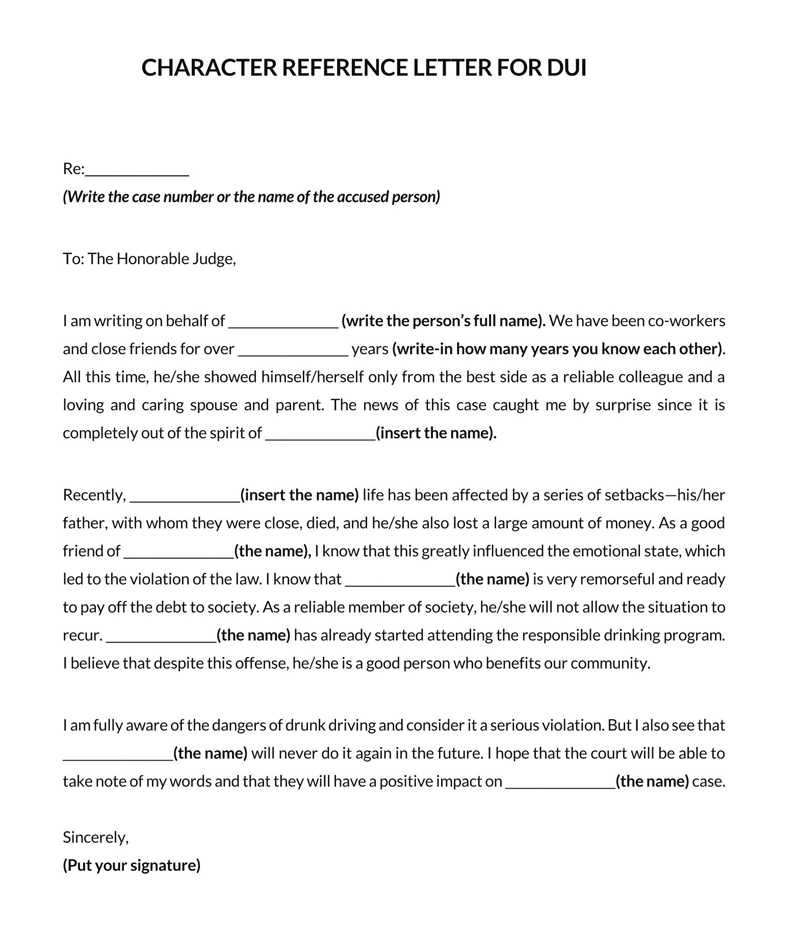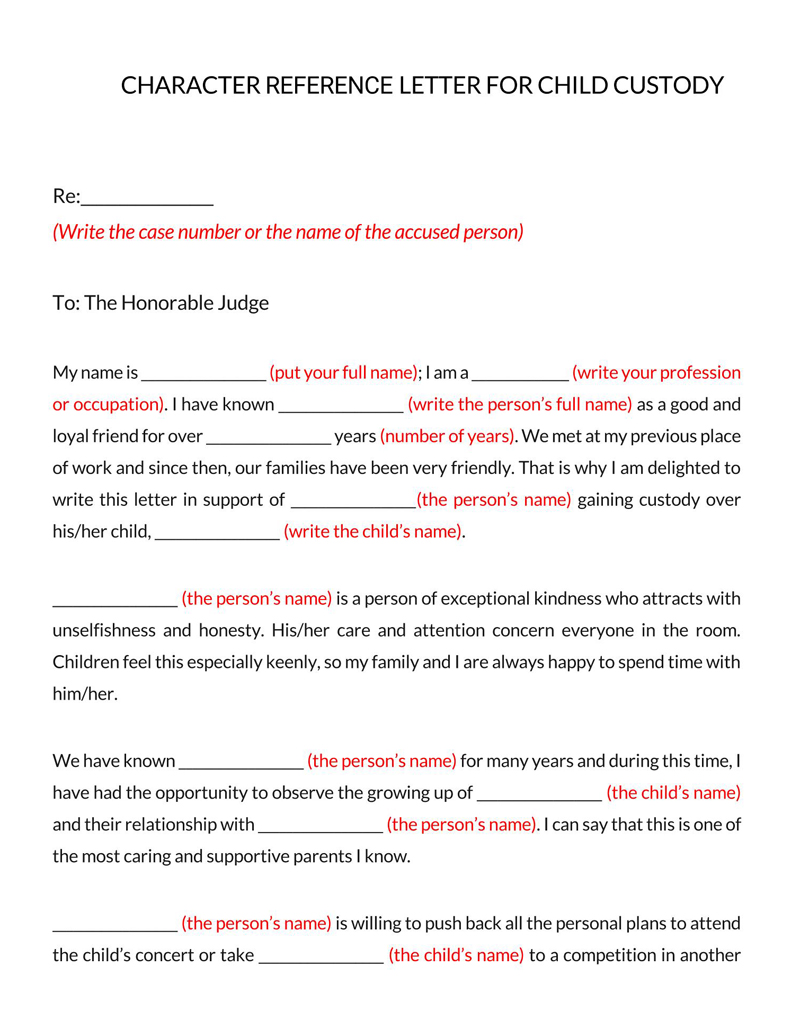Personality and character are essential in ruling a court case regardless of whether it is a criminal case or a case without charge, such as child custody cases. Therefore, character reference letters ought to be written by someone close to the defendant to increase the letter’s credibility.
To this effect,
It will usually be written by a family member, friend, or workmate, providing details about the accused’s personality and moral qualities that can be typically influential to the case at hand.
Through the letter, the judge gets a better understanding of the accused as a person. Such reference letters are common in child custody and drunk driving (DUI) cases.
Sample Letters




How is it Helpful?
Through this letter, the judge or magistrate can understand who the defendant is from a more personal perspective based on a family member, friend, or co-worker’s account rather than basing the case purely on the offense or accusations at hand. It is best to craft it with the offense (charge) or case in hand in mind.
Who Can Qualify to Write it?
When selecting who can write the letter, the primary consideration is if they are willing to present the defendant in a positive light. As a result, it is suitable to use someone close to the defendant for a significantly long time, such as a sibling.
EXAMPLE
For a DUI, having an employer or spouse write it illustrating the significant role of the defendant at work or home. In addition, psychiatrists can write it for child custody if the psychiatrist holds a session with the child(ren) in the parent’s presence. Other categories of people, such as a teacher, can also write letters.
The referee is expected to be truthful with any information they present in it. This can be helpful if they are called to take a stand and provide additional details, which should not be contrary to the details in the letter.
Who, Why, and When?
This letter for character reference is unique to the defendant and case.
The most common areas where it is used include:
Legal case
In a case with a charge or conviction, it can be used in an attempt to influence the court’s decision. In such a legal case, it is best to use a reputable member of the society as their reference letter will usually have more weight in court.
If a family member writes it, they can include a more in-depth perspective of the probable root of the defendant’s actions and reassure the court that the defendant has a support system to facilitate their rehabilitation at home.
Child custody
In some cases of child custody, such as divorce due to personal differences, there is usually no charge against any party. For the court to determine the parent better suited to take care of the child(ren), it will usually want to know more about the parents’ personalities and attributes.
This letter can then be submitted to the judge by either or both parties to persuade the judge’s verdict towards the parent being recommended. A family member or a friend will be better suited for such a reference letter.
They can discuss how loving and caring the parent is and describe the nature of the parent with the children in question. A friend can talk about how the individual interacts with other people, the length of their friendship, and what makes the person a good friend.
DUI
Another instance where it can be utilized is for (Driving Under the Influence) DUI cases. It can be submitted to the court to plead the defendant’s case. A close relative, dependent, or employer can write this reference letter for a DUI. It can describe the vital role of the defendant at home or work, stating how severe punishment such as detention or revocation of their driving license would negatively impact those who depend on the defendant.
Writing a Character Reference Letter for Court
Once it is clear that the defendant has some positive qualities worth bringing forth to the judge presiding over their case, this letter can be written to get the judge to give a more lenient penalty or verdict. It should be prepared in a formal manner as it is a legal document. Typically, it will have five parts header, introduction, the body of the letter, conclusion, and sign-off.
Section 1: Header
The first item to appear is a header that immediately communicates who sent it, when, what it is about, and to whom the letter is addressed to.
- Name of the writer: The sender’s official name is necessary for the judge or magistrate to understand who they interact with. The name is vital if the court has to refer to official records.
- Address: A valid physical address should be given. The address is often used for correspondence if the court wishes to respond or communicate something.
- Date: The letter must be dated. Dates are essential tools for referencing in law.
- Subject line: A subject line that states the purpose of the letter should be supplied. For example, “Character reference Letter for John Doe.”
- Case number: Each case (ongoing or completed) in a court will have a case number – a unique identification number for judges and other involved parties to identify the case and case files.
- Greeting: A formal greeting to the letter’s recipient should be given. The greeting should be formatted as follows; “To the Magistrate/Judge, the specific court location.” Any references to the judge or magistrate from this point should be “Your Honour.”
Section 2: Introduction
Before getting into the pertinent details of the letter, it should first introduce the author to the judge or magistrate. The details that will typically be expected in this section are the author’s name and a statement of how they are related to the defendant. The nature of the relationship should be explicit, and information such as how long the two (author and defendant) have known each can be vital in asserting the level of closeness between them.
Section 3: Body of the letter
The following section is the body, which takes up the most significant portion of the document. This section should show the author’s awareness of the facts of the case, their opinion on the matter, the defendant’s character traits, and other details that can positively impact the defendant’s case.
This information can be classified into the following sections within the body of the letter:
- Relevant background: This section should be clear what the individual is pleading guilty to and must state the matter at hand
EXAMPLE
A DUI or public misdemeanor.
- Qualities of the person: The letter should then highlight the positive qualities of the person. This is information that the judge or magistrate may not have access to unless it is brought to them by the defendant and their team. Therefore, the letter can discuss any voluntary work such as commitment at a community center, their tendency to help others, and how they relate with other people in their community. Qualities outlined in this section should be as specific as possible; use real-life examples as supporting evidence to the claims made in this section.
- State if the charge is the defendant’s first offense: It should be clear if this is the defendant’s first charge for the specific offense they are being charged with. If the person had done it previously, be forthcoming and declare it as this is usually an indication that it is not “unusual” for the person to behave the way they did. Precaution should be taken when talking about previous accounts as it might impact the case negatively.
- Whether the person has shown remorse: Remorse is a desirable quality for accused persons being rehabilitated. The letter must then declare that the person in question is deeply remorseful for what they did. This can be supported by mentioning initiatives or steps they have taken to correct their mistakes.
- Discuss any hardships, or sacrifices faced by the person: The next part should outline the impact of the prosecution on their dependents or at work. The impacts of legal charges can vary depending on the offense and magnitude of the same.
EXAMPLE
Depression, termination of employment, repentance, physical injury, etc.
- Familiarity with court case: A statement of facts of the case in the letter shows the court that the letter’s author is well informed and thus increases the credibility of the letter. The letter can also highlight the consequences of the potential criminal penalty expected. These consequences can be family-related, work-related, or personal.
EXAMPLE
If the accused is the family’s only source of income, it should be stated how potential jail terms might cause the suffering of those who are dependent on the accused, such as losing their home, lack of tuition fees, etc.
- Changes after the incident: A defendant’s actions after the offense can go a long way in convincing the judge or magistrate that they acknowledge their mistake and are willing to correct it. The letter can therefore mention these actions or changes.
EXAMPLE
For a DUI, the initiative could be enrolled for counseling or pay for any damages they caused while committing the offense.
Section 4: Conclusion
Afterward, a comprehensive conclusion should be provided. The conclusion can reiterate that the defendant is remorseful, and they are working to correct their mistake to ensure not to repeat the offense. The letter can also state that the author is aware of the seriousness of the crime and the dire consequences even though they are pleading on behalf of the defendant.
Section 5: Sign-off
Lastly, the letter should be signed off. Then, a complimentary close such as “Sincerely” should be provided, followed by the author’s signature, name, and contact details.
Character Reference Letter Template
[Sender’s name]
[Sender’s address]
[Date]
[Subject line/RE, e.g., Defendant’s Name]
[Case Number]
[To The Honorable Judge/Magistrate [Name of Judge]
I’m [Author’s name], a brother to [Defendant’s name]. He has been an emotional and psychological support system in our home and has always been a loving and compassionate father, brother, and uncle.
In light of the recent separation between defendant’s name] and his wife, I would love to recommend him as the principal custodian of his two children – [children’s names].
Defendant’s name] has demonstrated more than once that he is a capable parent while still working for his family. His relationship with the children is seamlessly natural, and he is an active parent with [child’s name] soccer practice and [child’s name] piano classes. He always makes it to the mentioned activities on time and is very social with other parents.
Separating [children’s names] from their father will scar his optimism and remove his ‘support system,’ as he likes to refer to the children. I believe that giving him custody of the children will be in their best interest as he lives closest to their school and most of the children’s friends.
Your Honor, I sincerely hope that this letter will favor the defendant’s case and give you more insight into who [defendant’s name] is as a person as you make your decision. Defendant’s name] has proven to be more than a capable parent over and over and an epitome of near-perfect parenthood.
[Complimentary close]
Signature]
[Author’s Name]
Character Reference Letter Sample
If you are tasked with writing a reference letter for court, a helpful example is at your disposal. This simple guide offers insights and a practical template to assist you in navigating the complexities of legal correspondence.
sample
Re: Character Reference for Michael T. Johnson, Case No. 2024-CR-12345
Dear Judge Johnson,
My name is John A. Smith, and I am writing to provide a character reference for Michael T. Johnson, who I have known for over 15 years as a close family friend. My connection with Michael has allowed me to gain a deep understanding of his character and values.
Michael is pleading guilty to a DUI offense. I have been in regular contact with him since the incident and have discussed the details and circumstances that led to this regrettable situation.
Throughout the time I have known Michael, he has consistently displayed qualities such as compassion, responsibility, and active involvement in our community. For instance, he has volunteered at the Springfield Community Center for the past five years, dedicating his weekends to help underprivileged children with their education.
To my knowledge, this DUI charge is Michael’s first offense. He has no prior history of such behavior, and this incident seems to be an unfortunate anomaly in his otherwise responsible life.
I can affirm that Michael is deeply remorseful for his actions. He has expressed his guilt and regret to me on numerous occasions and has taken concrete steps, such as enrolling in a responsible driving course and attending weekly AA meetings, to demonstrate his commitment to change.
The legal proceedings have significantly impacted Michael, leading to stress and anxiety which have affected his mental health and job performance. These challenges have been profound and life-altering for him.
I understand that if convicted, Michael may face penalties including fines and potential loss of his driver’s license. Such outcomes would not only affect him but also his role as a primary caregiver for his elderly mother, Mrs. Johnson, who relies on him for daily support and transportation to medical appointments.
Since the incident, Michael has made notable changes in his life. He has volunteered for additional community service, focusing on educating teenagers about the dangers of drunk driving, and has repaired the damages caused during the incident.
In conclusion, while I acknowledge the gravity of Michael’s offense, I firmly believe in his remorse and commitment to change. I respectfully request your consideration of his efforts to rectify his actions and the impacts a severe sentence may have on his dependents.
Sincerely,
John A. Smith
Analysis
The provided character reference letter is a useful sample to follow for several key reasons:
- The letter begins by introducing the author and clearly stating their relationship with the defendant. This personal connection is crucial as it establishes the credibility of the author and the context in which they know the defendant.
- The author demonstrates an understanding of the defendant’s situation, including the specific charge (DUI in this case). This shows that the author is not blindly advocating but is informed about the circumstances they are discussing.
- The letter doesn’t just list the positive attributes of the defendant; it provides specific examples and contexts (such as volunteering at a community center). These concrete examples add authenticity and depth to the claims about the defendant’s character.
- The letter acknowledges the offense committed by the defendant and clearly states if it’s a first-time offense. This honesty is important as it shows that the author is not trying to downplay the seriousness of the situation.
- The letter emphasizes the defendant’s remorse and the proactive steps they have taken post-incident (like attending AA meetings and a driving course). This is crucial in showing the court that the defendant understands the gravity of their actions and is taking responsibility.
- It discusses the impact of the legal proceedings on the defendant, such as stress and job performance issues, and potential consequences on their dependents. This humanizes the defendant and provides the court with a broader picture of the situation.
- The letter details the positive changes the defendant has made since the incident, which supports the argument that the defendant is committed to improvement and less likely to re-offend.
- The conclusion reiterates the author’s belief in the defendant’s remorse and potential for rehabilitation. It respectfully requests the judge’s consideration, acknowledging the severity of the offense while pleading for a fair judgment.
- The letter ends with a formal sign-off, the author’s signature, and contact information, adhering to the norms of professional correspondence.
Do’s and Don’ts
Multiple things should be considered when writing such a letter for the court to fulfill the legality and improve its efficiency in communicating the defendant’s character to the magistrate or judge. These considerations have been categorized into do’s and don’ts.
Do’s
Below are the things that should be done if the letter serves its intended purpose correctly.
- Be honest: Any information in the letter must be accurate and factual; otherwise, misrepresentation of information can be termed as misleading by the judge or court.
- Maintain a positive tone: It ought to highlight the defendant on a positive note. This can be done by outlining all the person’s good qualities and backing them up with specific examples where they demonstrated these qualities.
- Be brief and precise: One page will usually be enough for it. However, the letter should be written as a formal document where the critical point is arrived at rationally and quickly.
Don’ts
The following are things to avoid when writing such a letter for court.
- Avoid passing personal judgment about the defendant’s guilt or innocence. The letter can, however, show acknowledgment of the seriousness of the matter at hand.
- Don’t be biased. It should show the author’s opinion from a neutral perspective. For instance, they acknowledge the offense committed but give reasons why they believe the judge or magistrate should consider being lenient.
- Avoid critiquing the law, the judge, or the police. Instead, keep the letter professional by respecting other involved parties’ perspectives and decisions on the case at hand.
- Do not suggest to the judge or magistrate how they should sentence the person. This is deemed disrespectful to the judge’s authority in the matter.
- Avoid antagonizing the judge by using a disrespectful tone and telling them that they are wrong to prosecute the defendant.
Frequently Asked Questions
It should be sent to the defendant or their lawyer, not directly to the judge or magistrate. Once they have reviewed the letter, they can then forward it to the judge or magistrate. Note that the letter has to be addressed to the presiding judge or magistrate and not the court.
The letter should be issued as early as possible before the court hearing date. Submitting it early gives the lawyer enough time to review it and gather important details about the defendant that they did not know.









